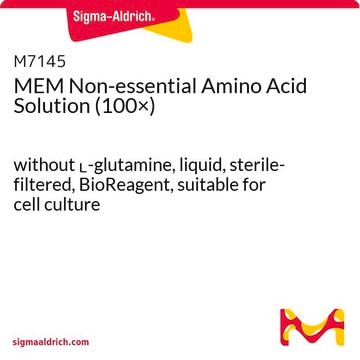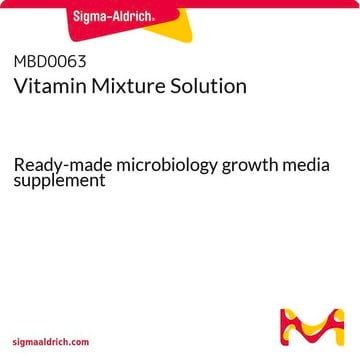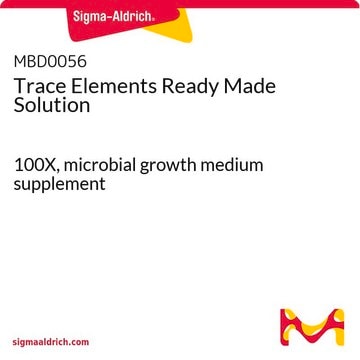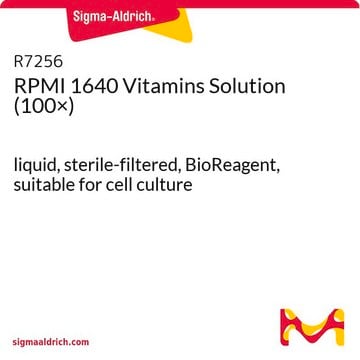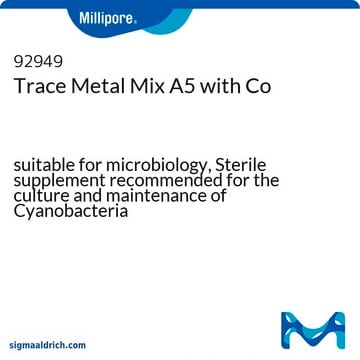M6895
MEM Vitamin Solution (100×)
sterile-filtered, BioReagent, suitable for cell culture
Sinónimos:
MEM media, MEM vitamin solution
Iniciar sesiónpara Ver la Fijación de precios por contrato y de la organización
About This Item
Código UNSPSC:
12352205
eCl@ss:
32160406
NACRES:
NA.75
Productos recomendados
esterilidad
sterile-filtered
Línea del producto
BioReagent
formulario
liquid
técnicas
cell culture | mammalian: suitable
impurezas
endotoxin, tested
color
yellow to dark yellow
pH
7.0-8.0
aplicaciones
agriculture
Condiciones de envío
dry ice
temp. de almacenamiento
−20°C
Descripción general
MEM Vitamin Solution (100×) is a sterile-filtered bioreagent, which is suitable for cell culture.
Synthetic/ basal media used currently contain amino acids, carbohydrates, vitamins and salts. Eagle′s minimum essential medium (MEM) is a modified version of BME (basal medium Eagle′s), which contains increased amounts of each amino acid. Addition of water soluble vitamins such as, inositol to various culture facilitates the hatching of hamster and rabbit blastocysts. Vitamins also influence the metabolism of glucose in sheep and mouse embryos.
Aplicación
MEM Vitamin Solution (100×) has been used in:
- glial conditioned medium for primary neuronal culture
- in Luria-Bertani (LB) medium or minimal medium (MM)
- in private medium (PM = aminoacid-starved medium) for the Aa deprivation experiments
MEM Vitamin Solution (100×) is used for the following applications:
Adding supplements of vitamins to media stimulates growth and prolongs the viability of cells in culture. This concentrated supplement adds nutrients and reduces the biosynthetic burden on cell in vitro.
- In the preparation of DMEM medium (for primary neural cell culture)
- For the maintenance of cell lines in Eagle′s Minimum Essential Medium (the medium is supplemented with MEM Vitamin Solution along with other components)
Adding supplements of vitamins to media stimulates growth and prolongs the viability of cells in culture. This concentrated supplement adds nutrients and reduces the biosynthetic burden on cell in vitro.
Código de clase de almacenamiento
12 - Non Combustible Liquids
Clase de riesgo para el agua (WGK)
WGK 1
Punto de inflamabilidad (°F)
Not applicable
Punto de inflamabilidad (°C)
Not applicable
Certificados de análisis (COA)
Busque Certificados de análisis (COA) introduciendo el número de lote del producto. Los números de lote se encuentran en la etiqueta del producto después de las palabras «Lot» o «Batch»
¿Ya tiene este producto?
Encuentre la documentación para los productos que ha comprado recientemente en la Biblioteca de documentos.
Los clientes también vieron
Motoko Tanaka et al.
The Kobe journal of medical sciences, 57(3), E116-E127 (2011-01-01)
Although the viral factors of host adaptation from domestic poultry to humans have been studied several times since the first cases of direct transmission of highly pathogenic avian influenza viruses from domestic poultry to humans were confirmed in 1997, the
Kenneth Verstraete et al.
Nature communications, 8, 14937-14937 (2017-04-04)
The pro-inflammatory cytokine thymic stromal lymphopoietin (TSLP) is pivotal to the pathophysiology of widespread allergic diseases mediated by type 2 helper T cell (Th2) responses, including asthma and atopic dermatitis. The emergence of human TSLP as a clinical target against
Ken-Ichi Oinuma et al.
Journal of bacteriology, 197(6), 1115-1124 (2015-01-15)
The degradation mechanisms of natural and artificial hydrazides have been elucidated. Here we screened and isolated bacteria that utilize the acylhydrazide 4-hydroxybenzoic acid 1-phenylethylidene hydrazide (HBPH) from soils. Physiological and phylogenetic studies identified one bacterium as Microbacterium sp. strain HM58-2
Culture Media, Solutions, and Systems in Human ART
Quinn P
Culture Media, Solutions, and Systems in Human ART. Cambridge University Press (2014)
G K Collington et al.
Gut, 42(2), 200-207 (1998-04-16)
The pathophysiology of enteropathogenic Escherichia coli (EPEC) diarrhoea remains uncertain. EPEC adhere to enterocytes and transduce signals which produce a characteristic "attaching and effacing" (A/E) lesion in the brush border membrane. The present in vitro study was designed to determine
Nuestro equipo de científicos tiene experiencia en todas las áreas de investigación: Ciencias de la vida, Ciencia de los materiales, Síntesis química, Cromatografía, Analítica y muchas otras.
Póngase en contacto con el Servicio técnico
